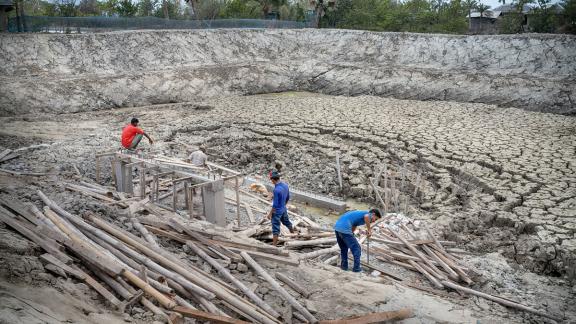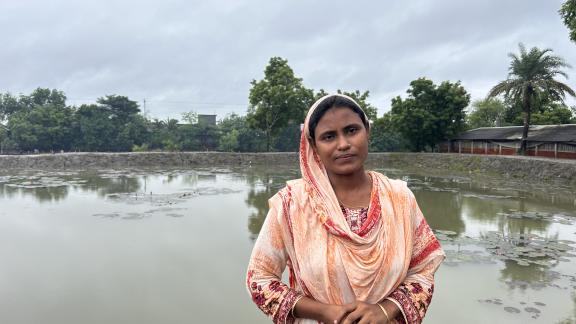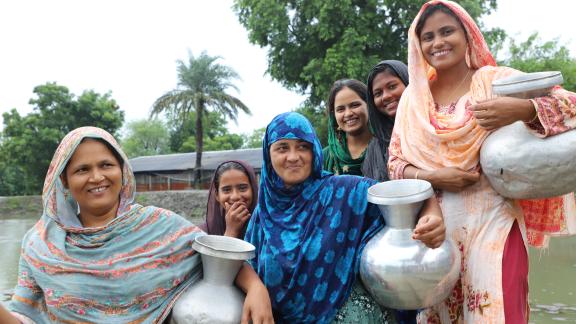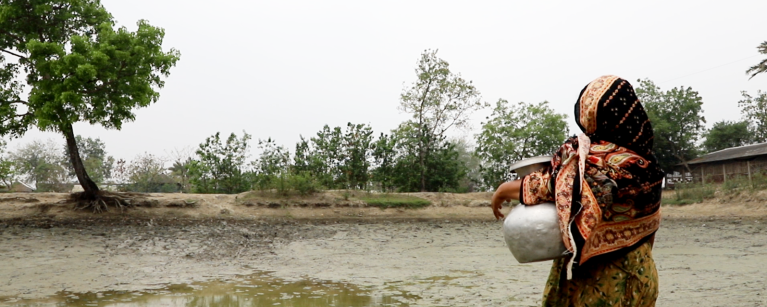It was raining all day long. Sometimes a heavy downpour, sometimes a gentle drizzle. The pond was filled with fresh water and vibrant red-magenta lotus leaves, some lotus buds were eagerly waiting for their bloom. When raindrops fell on leaves, they quivered, creating an epic poetic scene. Nearby, some women walked to the pond to collect water, smiles brightening their faces. For them, it is near to fairy tale. Why shouldn’t be? They have waited for 15 long years for this tale to tell, before Oxfam’s support to restore and enhance ecosystem of this pond.
Now, water can now be used for daily needs and its salinity level is within permitted bounds. A true blessing for hundreds of families of Samabay Guccha Gram (village) under the Munsiganj Union of Shyamnagar Upazlia, Satkhira.
If the introduction painted a smooth picture in your mind, set that aside for a moment. For the past 15 years, this pond has been ‘an opportunity cost’. The pond and the Chuna River, one of Bangladesh's saltiest rivers, are divided by an embankment that is five to seven feet high. Before the Severe Cyclonic Storm Aila struck on May 25, 2009, this pond was the community's nearest source of fresh water. However, during Aila, the Chuna River overflowed, flooded the pond, and submerged the entire village with saline water. Since then, water from this pond was undrinkable.
Water is Everywhere, But No Water to Drink
Shyamnagar Upazila, under the Satkhira district is one of the major coastal regions of Bangladesh and one of the most climate-affected areas in the country. According to the United Nations, 73 percent of the people in five coastal upazilas including Shyamnagar in Satkhira are drinking saline water. Frequent natural disasters, extreme salinity, inadequate access to fresh drinking water, and food insecurity have made life miserable for thousands of people. Every single family here is affected by climate change, facing harsh social and economic conditions.
Samabay Guccha community, which is one of the climate-affected villages where over 200 families live. During the summer, the village faces an extreme shortage of fresh drinking water. Most families cannot afford rainwater harvesting systems, so nearly everyone relies on purified water for their drinking needs.
Women in this village walk approximately two kilometers to the nearest water purifier to collect fresh drinking water, making this trip at least 3-4 times a day. This results in a loss of hours every day solely for water collection. The water crisis also leads economic and social imbalances, as the financial cost of drinking water from community purifiers has increased more than fivefold over the past decade. It significantly hampers their ability to invest in better living conditions and education of their children. Additionally, the lack of drinking water leads to increase climate displaced, and contributes to gender discrimination, child marriage and violence against women.

Pond excavation. Photo Credit: Oxfam/Fabiha Monir
Before the pond restoration, Shadhona Rani (pseudonym), one of the residents of Samabay Guccha Village described her sorrow for inadequate drinking water, ‘We were dependent on this pond till before Cyclone Aila. We drank this water and used it for cooking. However, now fresh water is only available for two months during the monsoon; for the rest of the year, we depend on purified water. This not only costs us economically but also requires us to walk several kilometers multiple times a day. As women, carrying this load every day is particularly challenging.’
Cyclone Aila and Monira’s Battle for Pond Restoration
‘When Great Danger Signal No. 10 announced, none of us took it seriously, and we were not prepared. We thought cyclone wouldn’t happen at the last moment. When the storm surge hit, the water level was almost 10 feet (3 meters). This pond, houses everything submerged within moments. Then we realized the devastating situation caused by Aila. We all swam for survive toward the shelters.’
‘We couldn’t take our cattle with us that time. When we came back after two days, all of them were found dead and floating around on water’, Monira, a project participant of Oxfam and a leader of feminist climate movement was remembering severe cyclone Aila sat at the bank of the pond.
The pond water, which they relied on for drinking and cooking, suddenly became saline and undrinkable. But Monira didn’t give up, ‘After years of Aila, we thought, this pond should be restored. Otherwise, we couldn’t afford to buy and lost so many hours to collect water.’
Monira began seeking support from the government for the restoration of the pond. She tried to reachand discuss with the UNO (Upazila Nirbahi Officer). However, the UNO refused to listen to her.
In the meantime, during various capacity-building workshops, community meetings, and gatherings of feminist climate movement leaders as part of Oxfam’s Blue Economy and Inclusive Development for Climate Justice (BID4CJ) Project, the story of the saline pond was brought repeatedly. Community members emphasized that the struggle for fresh water could be addressed if the pond were restored.
Discussing about BID4CJ, this initiative aims to empower coastal communities to nurture healthy ecosystems and a climate-just economy in southwest and southeast Bangladesh through feminist climate movements, ecosystem restoration, and ethical business development. The goal is Local Ecosystem Restoration and Green Business Expansion through Gender Equity-Based Climate Action in Coastal Regions of Bangladesh.
From 2023 October-November BID4CJ, in collaboration with its partner organizations (Breaking the Silence (BTS) and the Community Development Centre-CODEC) began bridging the gap between local government and the community through collective actions. With a thorough needs assessment and an understanding of community perceptions, BID4CJ organized multiple stakeholder meetings that included local government officials, experts, and local representatives. These initiatives successfully garnered attention for the issue.
‘We have discussed this issue with our climate feminist movement under the BID4CJ project. Then a pond management committee made, and we collected photocopies of the national identity cards of more than 50 women and took sign in a manuscript for requesting restoration of our pond and brought around 20 women with me to the UNO’s office. Later, the UNO arranged a meeting with us and listened to our struggles regarding access to drinking water’, Monira said.
Nasrin Sultana, a field officer of BID4CJ Partner organization said, ‘We support underprivileged communities affected in their lives and livelihoods, promoting community stewardship in ecosystem management and economic development. Our climate feminist movement leaders have had a significant impact on the restoration of this pond.

Monira standing in front of the restored pond. Photo Credit: Shameul Islam
What next?
The pond has been restored, and Oxfam is now focused on ecosystem enhancement. With a five to seven feet slop protection activities following community-based solutions.
BID4CJ Programme Manager Dabaraj Dey from Oxfam said, ‘We have had technical test and the pond water found that its salinity level is now around 1 PPT (parts per thousand), which was 5-6 PPT before. We plan to create a community vegetable garden along the slop protection area as a part of integrated management, which will help solidify the soil and provide community members with an opportunity to be climate adaptive. Additionally, solar panels will be established as part of the gender protection.’
‘Oxfam has supported this community with the restoration of the pond and provided access to fresh water. However, it is the community's responsibility to protect and maintain the pond, ensuring its benefits for years to come’, he added.

The community members are happy to collect fresh water from the pond. Photo Credit: Shameul Islam
Shameul Islam Shovon Campaign Officer, Oxfam in Bangladesh
The writer can be reached at MShislam@oxfam.org.uk
